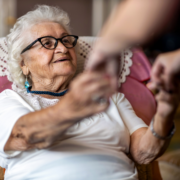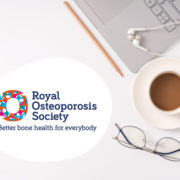Let’s Talk: Audiology Services Report
After receiving significant feedback from people in Northumberland about the end of the Hear to Help service provided by charity Action on Hearing Loss, we decided to investigate the potential impact on service users.
Hear to Help was a drop-in service delivered in community locations including libraries and GP surgeries. The drop-in service provided advice and information for people experiencing hearing loss, as well as performing general hearing aid/s maintenance, such as replacing tubes and batteries.The Hear to Help service stopped on 30 April 2019.
Feedback we received suggested that some people appreciated the service and did not want it to be withdrawn. We took a deeper look at the impact, if any, of the withdrawal of this service and to build a greater awareness and understanding of what people in Northumberland want and need in services to support with hearing loss.
It should be noted this work was done before the Covid-19 pandemic and the resultant change to services. However, the issues raised by respondents, particularly about communication, remain relevant now and in the future.
Aims
We wanted to find out:
- What do people in Northumberland think of audiology services?
- What audiology services are available for the people of Northumberland?
- What is good about audiology services in the county?
- What could be better about audiology services in the county?
Summary
Location of hearing loss services was a key area of discussion
- More than 50% of people we asked said it was easy for them to travel to an audiology clinic
- Some people were happy they did not need to travel to Newcastle
- Some people said the clinic was in a bad location with accessibility issues, seasonal transport issues, and public transport combined with limited clinic opening hours
- People who found it easy to access clinics used a range of different transport modes
- We are unlikely to have heard from the most isolated, vulnerable people in the county People who live rurally, with mobility issues, or limited social networks, and lower incomes, are likely to find it hardest to access hearing care clinics
- Some patients were supported by a carer or friend to attend a clinic or understand their care – a gap for patients in accessing or receiving hearing care independently
- Few people told us they used patient/community transport services to access a clinic
Information about and awareness of services was another key area of discussion
- We signposted people to: transport services, audiology clinics, and voluntary groups (like Carers Northumberland), showing a lack of awareness/information availability
- Some people were aware of hearing aid/s battery locations, whilst others were not
- One patient spoke about an information form given with their hearing aid/s used to support them to live with hearing aid/s. Contrastingly, 48% of people said they had not been offered training, advice, or support for living with hearing loss
- Some people believed the onus was on the person experiencing hearing loss to ask rather than professionals to let them know what support was available
- 10 of 11 people in our focus group did not know of the hearing aid/s postal service
- Some people were not physically able to clean or retube their own hearing aid/s due to dexterity problems, vision impairment, or not feeling confident enough
- 23% of people we asked agreed they had felt isolated as a result of their hearing loss
Drop in vs appointments
- Most people preferred drop-ins to appointments, finding them easier or more convenient
- In our focus group most patients preferred appointments to drop-ins
- Many patients were satisfied with the current audiology appointment system
- Interestingly patients gave similar reasons for their preference of either appointments or drop-ins – ease of managing transport arrangements as a priority
- 42% of patients would like to be told it was their turn to be seen by someone calling out their name. Some patients liked the idea of having a board with their name on
- 62% of patients we spoke to agreed the waiting time for their appointment was reasonable 71% of people agreed their appointment gave them ‘time to talk’
- 52% of people said they had their hearing aid/s serviced at the right time for them
Regular hearing aid/s maintenance and NHS audiology services
- People were positive about the quality of care provided in audiology clinics. People praised the staff and were satisfied they got what they needed from the service
- It is advised that hearing aid/s tubing is replaced every three to six months. 42% of patients had their hearing aid/s maintained in the last six months, and 46% had not
- Many people we spoke to were able to clean and change batteries in their hearing aid/s but could not change their tubes
- Some patients said they had waited a while to receive their new hearing aids
- People told us that not all hearing aid/s batteries/tubes were available everywhere
- Some patients said they found face to face communication easiest. Many services now offer a phone appointment system, a barrier to people with hearing loss
Hear to Help service
- Hear to Help was an important service for people experiencing hearing loss
- People at the Bell View focus group said the service had helped to show them how to maintain their hearing aid/s, and given them tube cleaners











